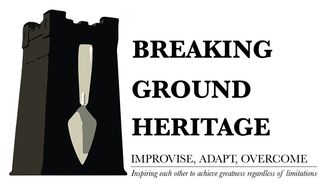Ethics and Codes of Conduct
Code of Ethics
Working with vulnerable members in our community requires a certain level of attention that might not be expected in your normal role. In heritage this can be increased again as we also have a duty of care to the heritage that we are custodians of.
It is advised that a code of ethics and conduct sheet be available to all participants and staff as soon as is feasible. This will set out from the very start what behaviors are acceptable and what actions might be taken should individuals not meet them. A signed master copy should be maintained throughout the duration of the project.
At BGH we have developed the following code of ethics into our daily working routine. Both staff and participants are expected to abide by them.
By adopting the following 7 principles, project participants and staff should have an enjoyable experience.
- Beneficence - The health and welfare of the participant and staff is paramount.
- Do no harm - Participants should not be at further risk of harm by coming on projects.
- Confidentiality – Participants must trust that their personal information is safe and will only be disclosed as agreed or in accordance with the Law
- Responsibility, reliability and dependency – Ensuring that commitments to participants are met where possible
- Treat everyone equally - Respectfully, patiently and politely
- Integrity – Honesty and willingness to do what is right
- Respect – The views, opinions and beliefs of others
Code of Conduct
Everyone is entitled to be treated with dignity, respect and courtesy in an environment free from bullying, intimidation, harassment or victimisation.
It is important to enforce an open and transparent, zero tolerance policy for aggressive, harassing or threatening behaviour, this also includes interpersonal communications. It is important to also clarify that malicious gossip – both in person, and online - just as serious and damaging as any other form of bullying and harassment.
In addition to providing general welfare, mental health and well-being services, the staff should be there to offer support and advice to anyone experiencing, or witnessing, bullying, harassment or discrimination. If there are any issues, a member of staff should be available/nominated for confidential assistance.
By taking part in projects participants should commit to the following code of conduct:
- No insulting, abusive or threatening language or behaviour towards staff, fellow diggers, or the visiting public and local community amongst whom we are living and working with;
- Avoid profanity, gender/sexuality/ethnic jokes, and references to politics, religion, and other sensitive topics. Not everyone feels the same way about these issues, and even casual discussion can create a tense atmosphere;
- Understand and be sensitive to the many different social conventions of the people around you – not everyone feels comfortable socialising in the same way;
- Respect confidentiality if it is requested.
- Activity whilst using the projects and/or affiliates’ internet connections will be legal, respectful and will not cause harm or bring this project into disrepute.
- Any communications you have whilst you are a part of our community - including online - will be held to the same standards as those above.
Participants should also commit to abide by the following formal project Policies and these should be available:
- Bullying and Harassment Policy
- Equal Opportunities Policy
- Complaints Policy
- Whistleblowing Policy
(These policies should be provided electronically as part of a pre-arrival pack and also available to peruse on site.)

